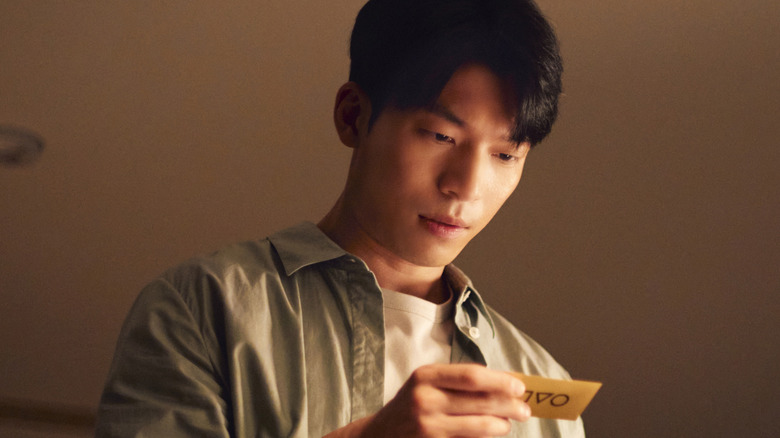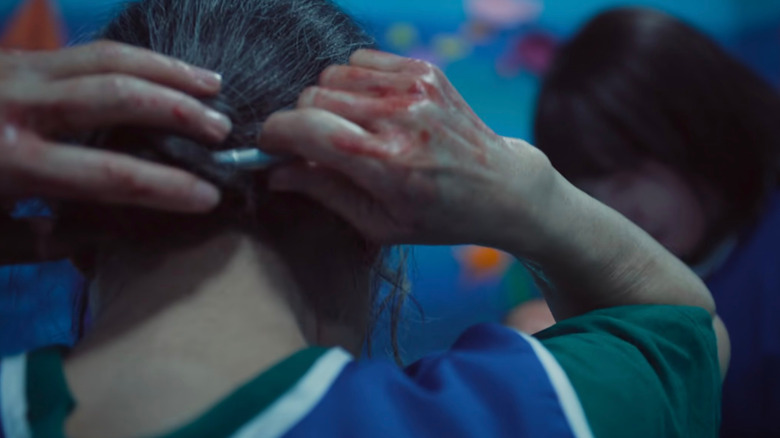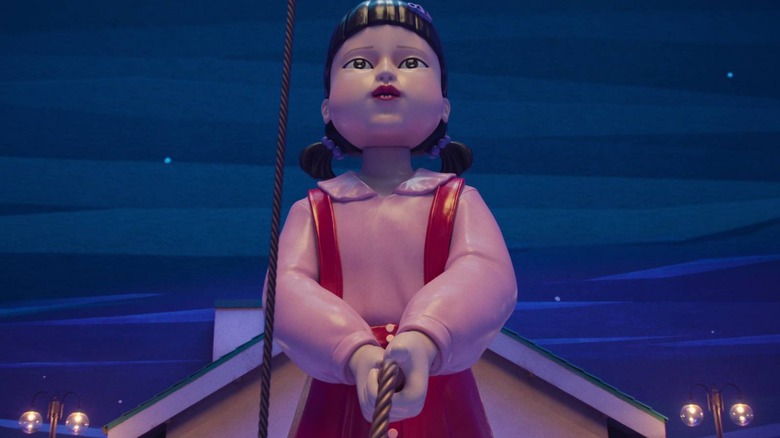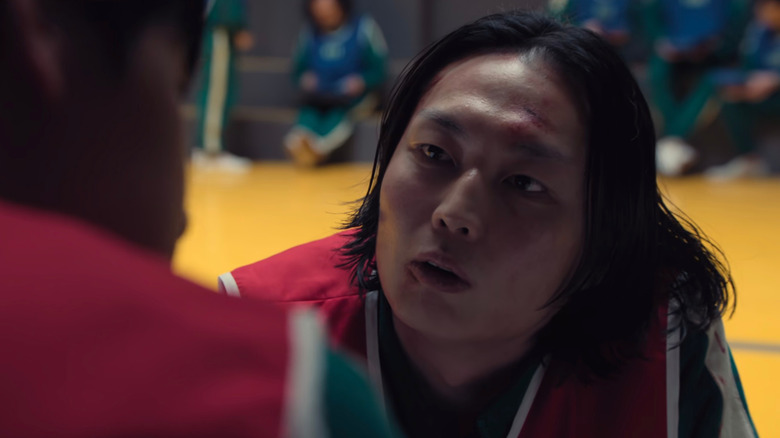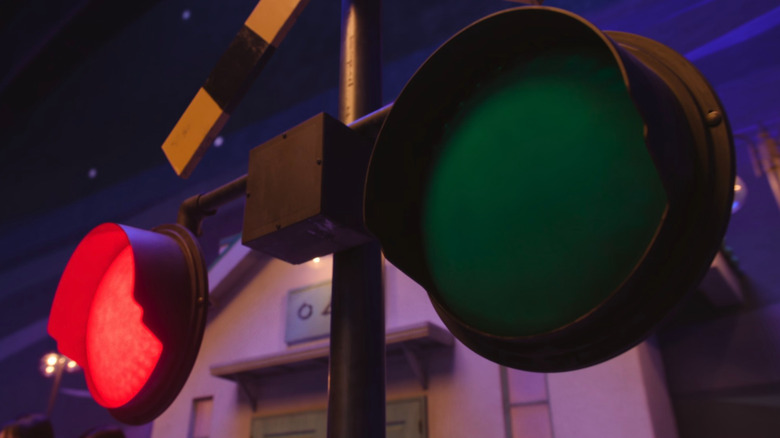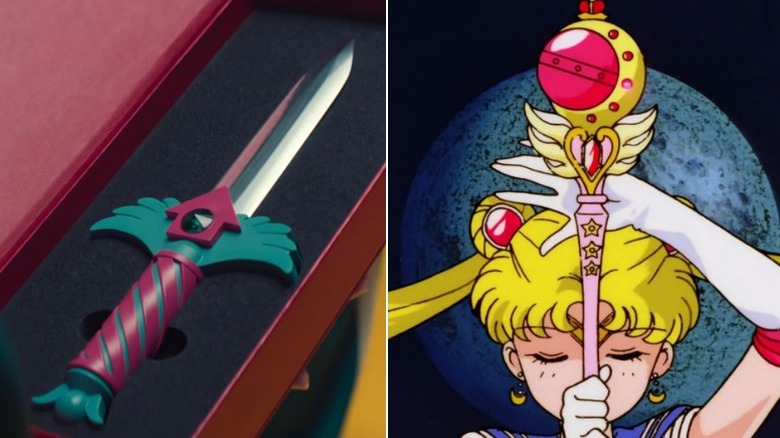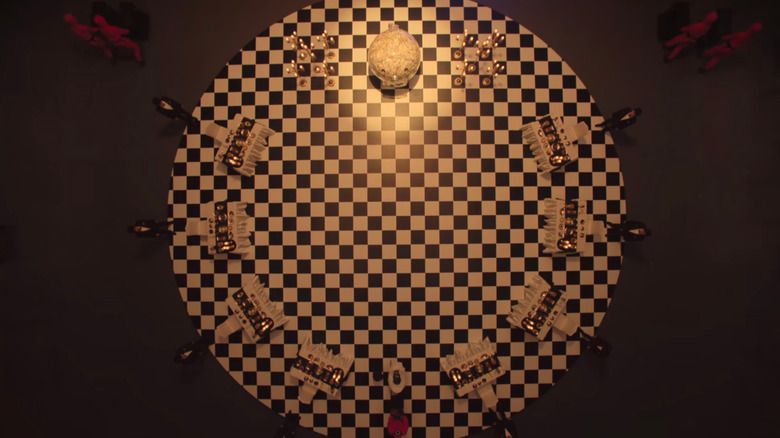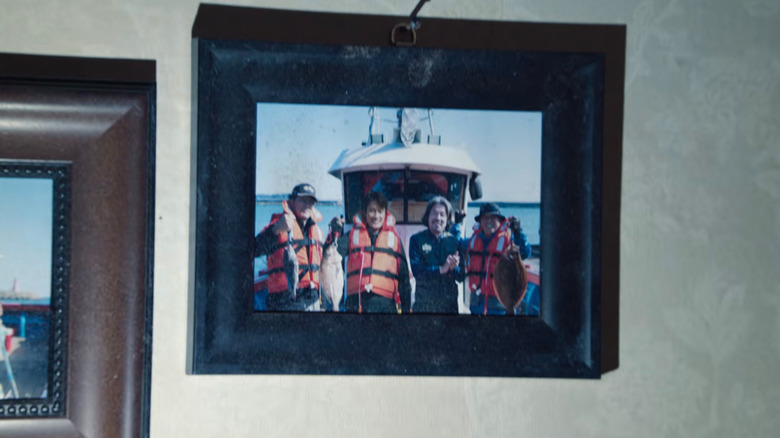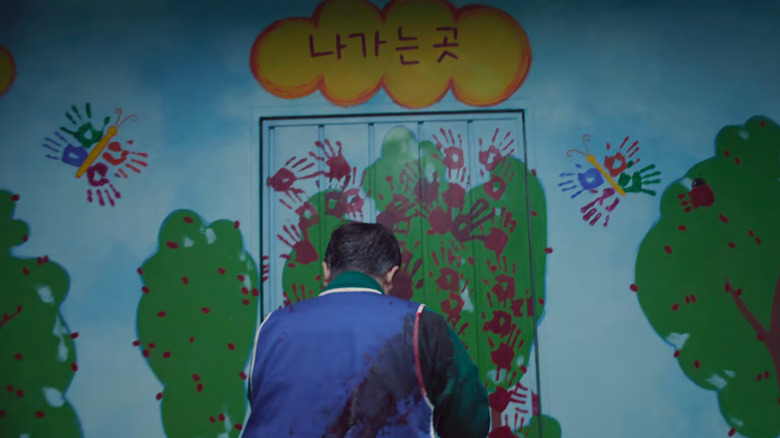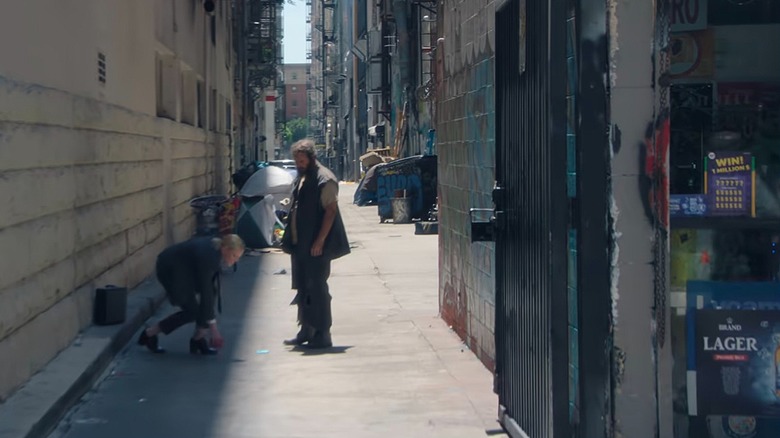Small Details You Missed In Squid Game Season 3
The third and final season of "Squid Game" is finally here, and it's one crazy ride. Fans have been on tenterhooks since the end of Season 2, which came to a close with an attempted rebellion. After the players are divided into two groups, one that wants to stop the games and one that wants them to continue, Seong Gi-hun (Lee Jung-jae) correctly predicts that the pink soldiers will show up should one group attack the other. He and his group — the people who want the games to end for good — use this as a chance to ambush the soldiers and fight their way to the control room.
The plan may have worked if it weren't for Gi-hun's group running out of ammo and the treacherous actions of Hwang In-ho (aka the Front Man), who is posing as a player called Oh Young-il. The second season ends with Park Jung-bae (Lee Seo-hwan) being executed in front of Gi-hun, leaving the protagonist (and the viewers) horrified while setting the stage for the final bunch of episodes. "Squid Game" Season 3 doesn't disappoint, and there's a lot more to it than first meets the eye — here are some small details in the show's farewell season that you may not have noticed.
Player 149's hairpin blade represents life and death
"Squid Game" Season 2 introduces the mother-son duo of Jang Geum-ja (Kang Ae-shim) and Park Yong-sik (Yang Dong-geun). Geum-ja may be old, but she has a secret weapon she keeps concealed — a blade hidden within her hairpin. It may seem odd that the guards wouldn't have checked any accessories on her person and would allow her to bring a weapon into the game. But that's probably all part of the fun for them and the VIPs.
In Season 3, we finally get to see Geum-ja use her knife twice in quick succession. During hide and seek, Geum-ja stays with Kim Jun-hee (Jo Yu-ri) as she gives birth. When the baby's delivered, she uses the knife to cut the umbilical cord. A short time later, she and Jun-hee try to escape when they're confronted by Yong-sik, who has failed to kill anyone at this point and is at risk of getting eliminated himself. He turns his knife on Jun-hee and the baby, only for Geum-ja to stab her own son in the back, killing him. Geum-ja soon follows, which isn't really a surprise: Kang teased the fact her character wouldn't see the end of "Squid Game" Season 3 before it even came out.
The knife serves two purposes — violence and practicality. It helps usher life into this world and also ends it. It's representative of the duality present within the game, which shows humanity at its worst but also the hope that can arise from it.
The jump rope song has sinister undertones
"Squid Game" has truly mastered the art of juxtaposing the show's horrors with innocent-seeming imagery. It goes hand-in-hand with the premise where all these people are participating in children's games to avoid death and walk away with a ton of money. But some terrifying implications may have gone over some folks' heads.
For example, during the jump rope game, a song plays as the rope moves over the bridge. You'll need a translation to know what it's saying, but it foreshadows the deaths that follow. One lyric goes, "Little friend, little friend, turn around." When Player 096 (Lee Suk) pushes players to their dooms, preventing them from fully crossing to the other side, Player 349 (Kim Geum-sun) realizes there's no point going forward and instead turns around, so she can at least stop jumping. It doesn't go well for her...
There are also lyrics containing instructions of "Touch the ground" and "Now away you go," which are pretty transparent in their double meaning. If a player gets hit by the beam, they fall to the ground several stories below. Away they go. There's also "Touch your toe," which could refer to the fact that if someone doesn't jump, the beam hits their feet (read: toes), and they die. Many movies and TV shows have made use of creepy songs sung by children, but this one takes it to the next level.
Superhero references galore
Depending on who you ask, Thanos (Choi Seung-hyun) might be the worst character of "Squid Game" Season 2. There's no denying the manic energy he brought to the games, and his name and Infinity Stone-coded fingernail polish made for fun Easter eggs for Marvel fans. He may have died at the end of "Squid Game" Season 2, but it turns out the show wasn't done with comic book references yet. In Season 3, Episode 1, "Keys and Knives," Nam-gyu (Roh Jae-won) talks to Min-su (Lee David) about how Se-mi (Won Ji-an) died the previous night, saying, "That f***ing b**** thought she was Wonder Woman or something." It's an off-hand remark that doesn't mean much on its own, but Wonder Woman actually gets another shout out in Episode 3, "It's Not Your Fault."
The VIPs discuss how Jun-hee may get a burst of strength from wanting to protect her newborn baby, with one saying she could turn into a "Marvel superhero." Another VIP then asks, "Like Wonder Woman?" He's promptly corrected that Wonder Woman is a DC heroine, but the various references point to how American comic books have permeated the global zeitgeist. It's also interesting to note how the poor players can correctly reference these characters while the VIP has no idea Wonder Woman doesn't belong to Marvel. Superhero movies might be an escape from reality for these young people, but the rich elite are utterly out of touch with what's en vogue. It seems they're too busy watching people die in gruesome fashion to bother with comic books.
Squid Game Season 3 loves the trolley problem
One of the most intriguing "Squid Game" Season 3 theories that emerged before it dropped on Netflix was that the trolley problem would factor heavily into the plot. This is a thought experiment where a person is presented with a train barreling toward two different tracks that could kill two different groups of people. For instance, 10 people you don't know are tied to one side of the tracks while your father is tied to the other. Who would you save? This idea absolutely comes into play throughout "Squid Game" Season 3.
When the players enter the room to play jump rope, the arena is structured like a railroad crossing. There's a signal like what one would find at a railroad crossing that flashes green when the timer begins. Additionally, the narrow beam the players must traverse is painted like a railroad track. However, Seong Gi-hun (Lee Jung-jae) is presented with his own personal trolley problem at the end of Episode 4, "222."
The Front Man (Lee Byung-hun) gives Gi-hun a choice: Gi-hun can kill the handful of other remaining contestants so that he and the baby can walk out of the games alive, or he can allow them to gang up on him, killing both him, the baby, and Min-su. Which lives carry more value? It's a classic trolley problem, and Gi-hun decides to spare the other men for the time being.
Player 044 had one prediction come true
Seon-nyeo (Chae Kook-hee) is a self-proclaimed shaman who has a lot of ominous warnings for Gi-hun. Some of her lines in Season 2 seem to contain hidden meanings, but ultimately, it's pretty transparent that she's a fraud who possesses zero special powers. This becomes clear in Season 3 during the game of hide and seek when Seon-nyeo has assembled a collection of followers that obey her commands in the maze. She ends up leading them to their deaths and she almost gets out alive.
Im Jeong-dae (Song Young-chang) betrays her right when they're at the exit, taking away a key so that she remains trapped in the maze. She curses him out after this, yelling, "The gods of heaven and earth will smash your skull, shatter your spine, and pulverize all your organs!" Shortly after this, Min-su kills her, but it turns out that statement would become a legitimate prediction.
Jeong-dae is one of the final contestants to make it to the last game — Sky Squid Game. During a scuffle, he falls from the top of a massive structure to the ground below. It's safe to assume that his skull was smashed, his spine was shattered, and all of his organs were pulverized by the impact. Seon-nyeo may not have had any special powers, but she got some poetic justice here.
The keys and knives resemble magical girl wands
In the hide and seek game, half the players are given keys to open doors in search of an exit, while the other half are given knives to kill those trying to escape. The bows of the keys and the cross-guards of the knives, in opposite pink and teal color schemes, are adorned with plastic wings and jewels laid atop arrows. These design choices are obviously meant to fit with the general "Squid Game" aesthetic of children's toys turned into dangerous tools. However, if you're not an anime or manga fan, you might not realize what they're evoking: magical girl wands.
In magical girl anime and manga series like "Sailor Moon," "Cardcaptor Sakura," and "Pretty Cure," the powerful heroines frequently use wands, rods, or staffs as tools and/or weapons. These magical items are fashionable as well as powerful — because why shouldn't you look as cute as possible while saving the world? Winged and jeweled motifs are common, a clear reference point for the designs of the key and knives seen in "Squid Game" Season 3. In fact, if you're done with the show and you're looking for a nice palette cleanser, you should check out this magical girl anime movie that's been killing it on Netflix.
The final dinner's setup is symbolic
The dinner scene in Episode 4 is fraught with tension, but it also holds multiple secret meanings for fans who pay close attention. It's notable that the table is shaped like a circle, as a sphere also plays an important role in the final game: In order to start it, a sphere embedded in the ground must be pushed. The final tower in the game is also shaped like a circle, so this is an ongoing theme throughout Season 3.
It's worth noting that the table set for the finalists during Season 1 is shaped like a triangle, one of three symbols often used in promotional art and logos for "Squid Game" and one of the shapes that can be seen forming a singular whole in the show's opening credits (the other being a square). Those shapes have shown up in multiple games played on the show over the course of its three seasons.
A peek into the Front Man and Captain Park's past
It's a blink-and-you'll-miss-it moment, but if you take a close look at the screen when Hwang Jun-ho (Wi Ha-joon) enters the cabin of Captain Park's (Oh Dal-su) ship, you'll notice that there's a picture of the captain smiling alongside several other people. One of those people — the one holding up a large fish and grinning for the camera — appears to be The Front Man himself. It's not spelled out how the two men actually met one another (perhaps they were in the same game before Captain Park was given a second chance on the ocean). However, what we do know is that, in Episode 4, Park's reign of lies and tyranny ends.
While audiences have known about his position within the game since he killed a drone pilot working for the police in Season 2, it takes a little while for the cops to grasp what's going on. In Season 3, Choi Woo-seok (Jeon Seok-ho) cracks the case. He searches Park's home and finds a mask and costume that links him to the Games, killing Park's dog along the way after it bites him. The local police temporarily delay him from delivering the truth to Jun-ho, but he gets through just in time. The Captain massacres much of his crew before Jun-ho takes him out with a spear fishing gun. For his part, Park deliberately misdirects Jun-ho's agents away from the area where the island is — something Jun-ho finally figures out, allowing his agents to get closer than ever to the Island by Episode 5.
The handprints on the wall during the hide and seek game mean more than you think
As with every room that's used for deadly gameplay in "Squid Game," the labyrinth in which the blade and key hide and seek game is done takes place in what looks like a child's romper room, complete with colorful walls covered with handprints in neon paint. This is a common decorative touch in many places where youth gather, from elementary schools to recreation centers. Those handprints can be used to measure a child's height or the shapes can be turned into animals like turkeys with a little effort. However, these handprints appear to have a subtle second meaning.
In the final room where the winning contestants must plunge the keys they've gathered by murdering each other into the lock of the last door, leading to quasi-freedom, the handprints become a frantic cacophony of red stains, looking like they were made by people in a crowd crush. Considering how many horrifying things happen in that room, it wouldn't be surprising if this was the intended effect. The way the show combines the childish with the nightmarish is second to none, and this is one more tiny detail that tells you everything you need to know about "Squid Game" as a whole.
The prize money delivery is darker than you might realize
Since Season 1 of "Squid Game," players have had their earnings delivered to them in a black envelope with a pink ribbon tied around it. We see it happen during Season 1 and then again in Season 3 when Jun-ho is presented with Kim Jun-hee's baby. While this may have initially seemed like a thematic choice that fits in with the pink and black colors favored by the Pink Guards, Season 3 brings their true meaning to horrifying life. Viewers watch as each dead player killed in the games is placed in a black casket with a pink ribbon tied around it. Those bodies are later harvested of their organs for the illegal black market, a trade that the games are unsurprisingly involved in.
It's an interesting juxtaposition between certain death and certain fortune, and obviously a way to tie the games right back into the show's themes — the rich keep getting richer, the poor poorer — and to become rich like those in power means to give everything you have, life, body, and soul, to a black void.
The lottery ticket in the final shot is more than set decoration
The final scene of "Squid Game" is sure to leave viewers asking big questions, such as "What is Cate Blanchett doing here?" and "How does some random American know how to play ddakji in a world where the TV show 'Squid Game' couldn't have taught Americans what it was?" After asking those questions, you might notice other details about the ending, including some choice mise-en-scène in the final shot.
As Blanchett's recruiter plays ddakji with a prospective Squid Game recruit in an alleyway, a lottery ticket hanging in the window of a nearby store is visible at the edge of the frame. This is a callback to the homeless people being asked to choose between bread and lottery tickets in the Season 2 premiere. It's also fitting for the broader themes of "Squid Game," which explore the ways those who are desperate enough can be made to do anything for a chance to win big, even amidst extremely low odds of winning.
Who is the new recruiter targeting in the closing scene?
The ending of "Squid Game" Season 3 is even bleaker than you first thought. After Hwang In-ho drops off Gi-hun's money to his daughter, he's riding in the backseat of a car traveling through Downtown Los Angeles. Specifically, we see the car approach Spring Street in Gallery Row. This is an area that's been increasingly gentrified in recent years, but it still runs adjacent to the city's Skid Row, which contains thousands of unhoused individuals.
In-ho then notices the recruiter (Cate Blanchett) playing ddakji with a man who looks worse for wear. This makes it readily apparent there is an American version of Squid Game, and Blanchett is playing the person who recruits competitors for that one. The fact that this scene takes place near Skid Row adds an extra dark layer to the show's ending, as it reveals that the American salesman is specifically targeting the unhoused population to get them to die trying to win their way out of poverty.
Netflix is currently making an Americanized "Squid Game," which the final scene sets up. Based on this teaser, the spinoff appears to maintain the original show's dark undertones, likely by featuring many contestants who don't have homes or are so saddled with various forms of debt they feel like they'll never be able to achieve the American dream.
